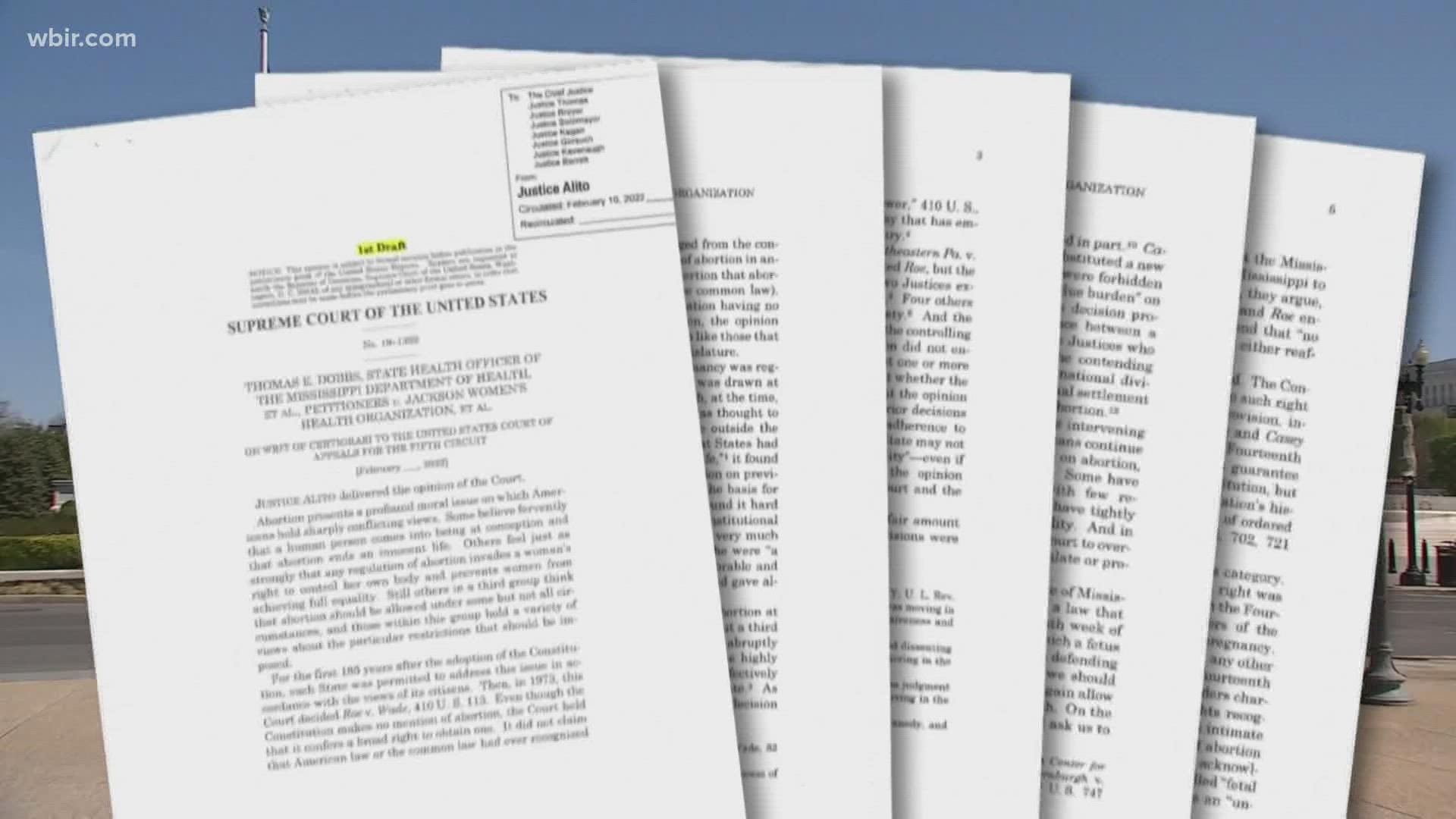TENNESSEE, USA — On Monday, reports swirled across social media about a possibly leaked draft of a Supreme Court opinion overturning Roe v. Wade, the landmark decision which guaranteed abortion treatment access across the U.S.
Politico claimed to have received a copy of the first draft of the majority opinion, which would strike down the decision. The draft was written by Justice Samuel Alito, according to Politico, and it was not the court's final decision, which can still change dramatically.
Tennessee is one of many states that have new laws that automatically go into effect preventing abortion treatments if Roe v. Wade is overruled. It also still has laws on the books from before the original ruling was handed down in 1973.
The state legislature passed the "Human Life Protection Act" in 2019, which would make providing abortion treatments a felony in the state. Since it would be a felony, people who give abortion treatments could lose voting rights and face several other consequences, including fines or prison time.
It also specifically does not try to punish women who receive an abortion. It allows abortions if the mother's life would be at risk, but specifically excludes cases where a provider gives someone an abortion treatment because they could attempt to kill themselves. Abortions in those cases would be illegal.
The law goes into effect if either the U.S. Supreme Court issues a decision overruling, in part or in whole, the landmark Roe v. Wade decision or Congress adopts a constitutional amendment banning abortion treatments. The law would go into effect 30 days after either of these conditions are met.
Laws like the "Human Life Protection Act" are known as trigger laws, since they trigger almost immediately following a decision from the Supreme Court.
Due to the law's stipulation that it would go into effect if either the Supreme Court issues an opinion "in part or in whole" overruling Roe v. Wade, it could also go into effect if the court only blocks pre-viability bans, or enacts any similar limitation without outright prohibiting abortion treatments.
State lawmakers also tried to pass a bill earlier during the legislative session that would have allowed people to sue anyone who provides abortion treatments, requiring providers to pay a $10,000 fine. The bill would have effectively allowed families of rapists to sue providers if their victims got an abortion.
A bill preventing abortion treatments from being sent through the mail in Tennessee passed the legislature and was sent to Governor Bill Lee's desk for his signature.
In Knoxville, a Planned Parenthood clinic that gave a variety of treatments also burned down on New Year's Eve of 2021. Authorities ruled it arson, but no suspect was identified.
Leaders said they were working with the design team to create a new building after their previous building was entirely destroyed.
"Patients in East Tennessee will continue to need us whether abortion is legal or not for many other services," said Ashley Coffield, the Planned Parenthood of Tennessee and North Mississippi CEO. "And abortion patients will need us for information, resources and support once it is illegal in Tennessee."
The Tennessee Right to Life organization said in a tweet, "Tennessee Right to Life will not issue a statement concerning the leak of the Supreme Court decision on the Dobbs abortion case. We will prayerfully wait until the official opinion is handed down."
The Tennessee Department of Health also reports the number of abortion treatments people receive across the state. From 2013 through 2017, that number dwindled from around 11,100 treatments to around 8,600 treatments. However, it jumped in 2018 to around 9,900 treatments.
Coffield also released a statement about the draft of the court's opinion. She said that since abortion treatments continue to be legal in Tennessee, doors to Planned Parenthood clinics would remain open and they will continue providing care up to the minute when they cannot legally do so.
The rest of the statement is available below.
We know the harm that will come from this decision, and we know that it will most impact Black, Latino, and other people of color who already disproportionately feel the effects of abortion bans and restrictions, a product of this country's legacy of racism and discrimination.
Eliminating the right to an abortion will have serious, life and death consequences for our patients, and we will fight like hell to defend their lives.
We at Planned Parenthood have been preparing for this outcome since well before 2019, when Tennessee’s General Assembly passed a trigger ban to take effect 30 days after Roe is overturned. Plans have been underway to hire and train patient navigators who will help people access safe and legal abortion outside Tennessee and Mississippi.
While our politicians are divided on this issue, a clear majority of Americans believe the government should stay out of private medical decisions, and many in our region will be shocked and outraged by this decision if it stands.
She also encouraged people to participate in planned rallies across the U.S. in major cities to demonstrate support for preserving access to abortion care.
Governor Bill Lee also released a statement supporting the draft's opinion but condemning the leak. His statement is available below.
“I am concerned by the leak and any attempt to thwart justice. If the federal courts return full authority to the states, Tennessee’s laws will automatically provide the maximum possible protection and offer a glimmer of redemption as America reconciles our troubled past. We are talking about families in crisis – not isolated clinical procedures – and our state will continue to provide protection, resources and care for both mother and child."

